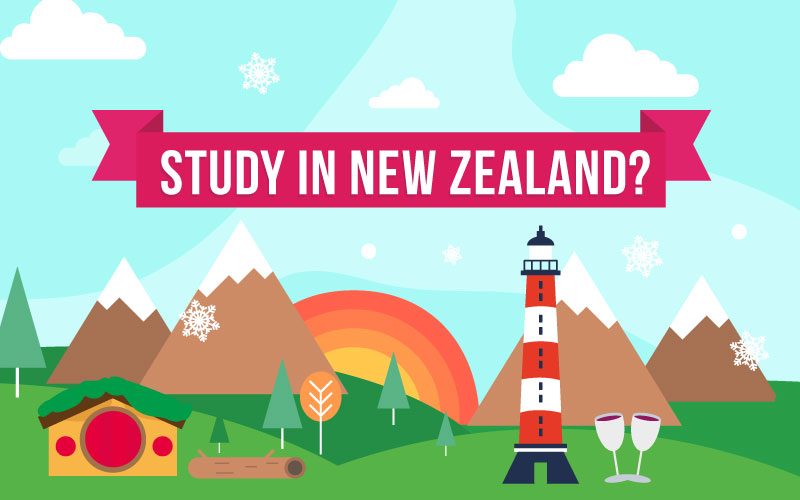452, Tulsi Arcade, Mota Varachha, Surat
Virtues of hard work and progressive advancement reside at the heart of New Zealand’s phenomenal culture. This well-developed country has lots to offer to international students for forging their path to broaden their career aspects.


The education system in New Zealand is designed, at all levels of studying, in such a manner that they enable their students to;
The New Zealand Qualifications Authority (NZQA) was a premier in creating a qualifications framework in the world, all the qualifications listed under the Secondary and Tertiary level of education are placed at appropriate levels on the New Zealand Qualifications Framework (NZQF) come with an assurance of globally recognized and reliable quality.

Students between the age of 5-10 years attend Primary school.
They begin with Intermediate school around 11-12 years, which is basically a transition bridge between primary and
secondary school to familiarize and adapt students to the change in education environment.
Intermediate schools can be offered at the Primary School itself or at a different school as well.
Popularly known as High Schools or Colleges, are channeled towards providing students with the National Certificate
of Education Achievement (NCEA).
They often times also offer vocational subjects like computing and tourism.
The Secondary Education in New Zealand provides different types of schools for parents to choose from;


The Tertiary level of education in New Zealand has a swaggering number of modern universities that showcase global
leadership in research and innovation.
Education options include;
Despite being heavily based in the British education system, New Zealand’s is thankfully much lower in cost. In addition, there are various scholarships available for international students, it may require some digging around and investigating and you can always reach out to your university and discuss your options.
Here is a brief review of the prevalent study options in New Zealand across different levels in New Zealand dollars:
| QUALIFICATION | DESCRIPTION | DURATION | AVERAGE ANNUAL FEES |
|---|---|---|---|
| Certificates Diploma Advanced Diploma |
Provides specialized knowledge of factual, operational, theoretical and technical detail in a specific field of work or study. | 1-2 years | NZ$8000-NZ$16,000 |
| Bachelor’s Degree, Bachelors Honours Degree |
Undergraduate programs focusing on specialized academic knowledge in a variety of courses across various disciples, armed with an independent and analytical approach. | 3-4 years | NZ$18,000-NZ$25,000 |
| Graduate Certificate Graduate Diploma | Vocational in nature, this qualification aims to develop practical skills of students in a speedy manner. Students can apply after completing their bachelors’ degree preferable in a similar field. It can sometimes be equivalent to a masters’ qualification. | 6-12 months | NZ$8,000-NZ$19,000 |
| Postgraduate Certificate and Diploma | This education credential empowers learners with advanced knowledge in a distinct area of study and makes you eligible to practice a profession. Requires a bachelors’ degree in any field. | 1-2 years | NZ$15,000-NZ$20,000 |
| Master’s Degree | Postgraduate programs provide highly specialized knowledge and a broader view of the subject area and available for coursework as well as research merit. It requires a relevant bachelor’s degree from a similar field. | 1-2 years | NZ$21,000-NZ$32,000 |
| Doctoral Degree Higher doctoral degree |
PhD is a premier research award which require a masters’ degree and a pre-approved research proposal by a panel of institute academics for admission. Holder becomes proficient enough to make substantial contributions to the field of study. | 3-4 years | NZ$5,000-NZ$10,000 |
*Please note all fee figures are indicative

New Zealand universities strive to offer various aids to international students eligible for financial waivers and assistance based on academic as well as extracurricular merit.
Many institutions offer variety of financial assistance for international students in the form of
To avail the financial assistance, students must send all the required necessary documents by the set deadline as requested by respective university.
New Zealand typically has two intakes for International students
However, there are some universities that also offer intakes in
In most universities, there are three deadlines per intake season and international students are advised to comply depending on the deadline they are aiming for and should
Depending on the course you are enrolled in, International students are allowed to work part-time up to 20 hours per week in New Zealand and full-time for the duration of the Christmas and New Year holidays. Main sectors offering part-time jobs are;
Immigration is embraced in New Zealand, so if you wish to continue living and working in New Zealand after the completion of your course you will need to apply for a Post-study Work Visa. This visa is valid for up to 12 months and allows part time employment till you can find a job in your field.
Upon successfully landing a job, contingent to the course you have graduated from, you may be granted work visa for up to 3 years.
This especially works in favor of international students with qualifications in fields that are sought-after in New Zealand such as;


International students are likely to require a Student visa in order to study in New Zealand.
There are a number of documents required to be submitted for the visa application such as;
The entire Application process can be very intimidating for many aspiring students but with our expert guidance and assistance OEC will offer you the best chance of success with acquiring your New Zealand study visa.
All you need to do is;
